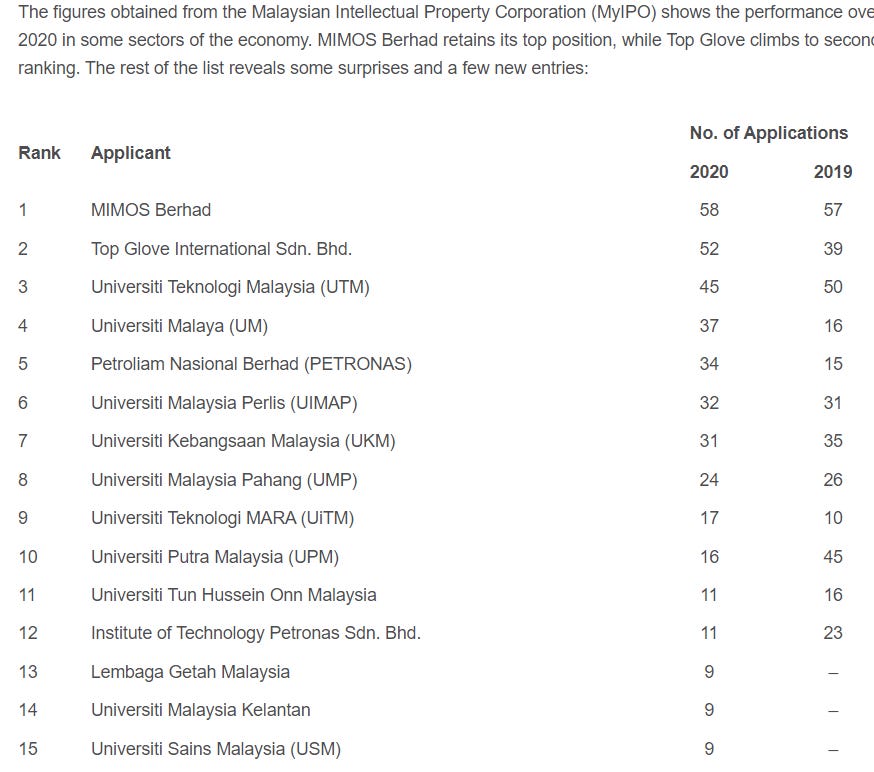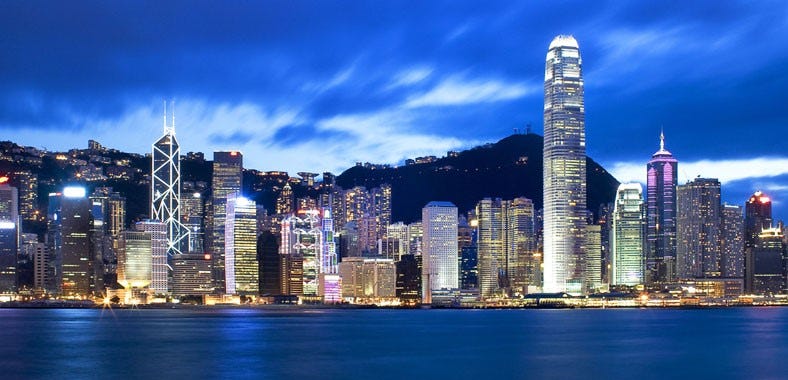Repressive Regulation is Doing Irreparable Damage to the Nation
Regulation is creating innovation stagnation
Malaysia’s highly regulated economy is stagnating in innovation, as incentive is being drained from the business community.
Today, Malaysia is one of the most highly regulated economies. The restricts and makes business cumbersome, destroying an environment that should be primed for innovation. With GDP plunging from the Covid crisis, business innovation should be one of the key drivers for recovery. Business innovation is not about digitization and Industry 4.0 as the 12th Malaysia Plan would make us believe. Innovation is about facilitating creativity, new ideas, that couple with appropriate technologies to create value added new products and services. This is not always about capital, and investment, rather its about creating an environment to nurture the correct mindset.
Regulation is dampening innovation.
Macro-Policy
On the macro-front, the New Economic Policy (NEP) has granted vast privileges to Bumiputeras. When dealing with the public sector, Bumiputera companies have opportunities ahead of other companies. Bumiputeras have exclusive ownership rights to Malay reserve land and business advantages through restricted licensing. This is promoting rent-seeking, rather than innovation led business models.
The NEP hinders the development of new innovative supply chain systems that may potentially bring the government sector savings and better quality products and services, than relying on a cohort of supplies that see the government sector as a captive market. An open market for procurement would save the government massive amounts on purchasing budgets. Malaysia is one of the few countries in the world where the government doesn’t seem to have a concern about buying better.
The NEP has created a rich Malaysia and a poor Malaysia
Higher education - Research
Within the public higher education sector, its clearly evident that the employment of academic staff is restricted primarily to Bumiputeras. In fact, public universities appear to favour employing foreign academics from countries such as India, Bangladesh, Myanmar, and Indonesia, over local non-Bumiputera citizens.
This policy has not only seen the stagnation of Malaysian universities in international university rankings, but local private universities are now rising above public universities. This is also costing Malaysia in domestic innovation and development of local intellectual property. The absence of meritocracy in who works in Malaysian public universities is compromising the nurturing of homegrown innovation. University research should be a massive incubator for innovation, where restrictive employment practices are hampering this potential. There can be no Silicon Valley without opening up public university research to domestic meritocracy.
Malaysia has dropped three places to 36th position in the Global Innovation Index over the last year, a figure that has been bumped up by questionable research content and IP fillings.
Lots of university patents filed but few commercializations
Equity Rules
The pending imposition of the 51% Bumiputera equity rule in the freight forwarding industry has signalled a message that successful businesses are not wanted. There are already stories of non-Bumiputera freight forwarders preparing to relocate to Indonesia, Singapore, and Australia. Some are reconstituting their businesses as foreign companies which can be 100% owned. This will bring an outflow of profits, and Malaysian ports will be treated eventually as nothing more than feeder and trans-shipment ports in the future. Restriction of who can own a business is not conducive to innovation. Restrictive equity laws just encourage the best and most innovative companies to leave and go off-shore.
Freight forwarders relocating away from Malaysia
Loss of Incentive
The requirement for 51% Bumiputera equity in SMEs across a number of industries, along with the requirement of companies dealing with government to have at least 30% Bumiputera equity has lasting consequences.
Having a business idea, the capital required, and access to potential markets is not enough in Malaysia. Non-Bumiputera entrepreneurs must also find a Bumiputera partner to invest in the firm. This is highly impractical, if innovation is to be nurtured from the enterprise start-up, where entrepreneurs must undertake tireless work, risk, and uncertainty for months or even years, most often without any wage or income.
In such situations it is difficult, if not impossible to find willing investors, or investors who won’t exploit the situation. Bumiputera investors would not be willing to take the same risks. Most want a guaranteed income, regardless of the stage of growth of the company, or performance. There are very few Bumiputera venture capitalists within Malaysia’s population.
The Bumiputera equity rules are totally unsuitable if Malaysia seeks to become a creative nation, using the innovation engine to grow and add value to the economy. The rhetoric of Malaysia transforming from a low cost, low technology economy to an innovation led Industry 4.0 economy just doesn’t match the regulations in place today. There is no incentive, its just not going to happen.
Equity Rules are Promoting Inequality
Malaysia’s GINI index, a measure of the inequality of income is 41, according to the World Bank. If income was distributed perfectly equally, the score would be zero, while 100 would represent perfect inequality. According to World Bank data, the lowest 10% of national population earned 1.8% of household incomes, while the top 10% of households earned 34.7% of income. With the poverty rate at 5.6% in 2018, and growing quickly due to the pandemic, the income gap is widening even more.
Malaysia’s equity policy requiring either 30 or 51% Bumiputera equity, depending upon the circumstances, favours the wealthier Bumiputeras to invest and get richer, thus further widening the wealth gap. There is little, if any benefit of equity requirements in assisting poorer Bumiputeras increase their income and wealth. They are the forgotten Bumiputeras in the government’s over-regulation of equity. The Bumiputera equity rules are helping the rich get richer and the poor becoming relatively poorer.
These Malaysians are not benefitting by the equity rules
The Super Makmur Tax on Companies
The one-off super tax on companies with an RM100 million turnover or more from 24% to 33% on 2022 is a concerning precedent. Unfortunately, governments have poor credibility when they make promises about tax. This could potentially accelerate the exodus of large local companies exiting Malaysia and discourage foreign head offices to locate to Malaysia.
The Flight of Companies
Malaysia has long been a net-exporter of capital, exceeding capital inflows. YTL devested power assets to 1MDB, primarily because tariff rates are controlled by the federal government. The Kuok family has for a long time been slowly moving out their business interests outside of Malaysia. Air Asia decentralised across the region due to high costs in Malaysia and bigger traffic opportunities. Liberty Shipping has moved to Singapore. Genteng Bhd moved the head office to Singapore. Hyundai closed its Asia Pacific headquarters in Malaysia and relocated to Indonesia, due to lack of a policy roadmap for the creation of an electric car industry. Tesco devested its assets in Malaysia. The IBM Global Delivery Centre relocated its head office out of Malaysia. Malaysian innovated Grab set up its head office in Singapore rather than Malaysia. Other Malaysian high-tech companies chose to start-up outside the country include Coin Gecko, a platform for multiple crypto-currency comparisons, and BigPay, a Malaysian banking app to Singapore.
Malaysia has missed a host of opportunities for foreign innovative companies setting up in the country. These include, Google, Amazon, Uber Technologies, Allianz, Vodafone group, and Akzo Nobel. Most moved to Singapore because of Malaysia’s relatively poor infrastructure, the poor level of human capital skills, and the poor regulatory framework. Zoom Video Communications, has selected Singapore over Malaysia for their first R&D centre in the region.
Malaysia loses local innovative start-ups
Brain Drain
Malaysia is one of the countries most affected by brain drain. About 1.7 million Malaysians are working overseas, with 54% in Singapore, 15% in Australia, 10% in the United States, and 5% in the United Kingdom. This is reported to be caused by the lack of career prospects in Malaysia, not only for non-Bumiputeras, but for Bumiputeras as well. Many Malays have gone overseas to work in higher education, medicine, research and the management sectors. Many blame the repressive corporate culture within Malaysian universities, civil service, and corporations.
Although the brain drain has slowed down due to the Covid-19 crisis, the government’s insistence on enforcing repressive Bumiputera equity policies and overall poor growth of the economy to provide lucrative markets for new innovations, will no doubt speed up the exodus of qualified professional once again, when travel is fully open once again.
Many Hong Kong businesses have long been run by talented Malaysian managers
The government has long acknowledge the problem through the formation of the Talent Corporation Malaysia Berhad (Talentcorp) to bring back Malaysian talent to the country in 2011. Talentcorp approved 5,366 applicants to date. However, bureaucratic complexities and strict immigration rules forbidding their non-Malaysian spouses to work, gain permanent resident status, and citizenship, makes return for many impossible.
Due to Malaysia’s current repressive regulatory framework, local innovation-based company start-ups are being hindered. Malaysia is becoming unattractive as the location of international high-tech companies. The World Bank Group ranked Singapore the second best country in ease of doing business, while Malaysia was ranked 12th in the 2019 survey.
Malaysia will be greatly disadvantaged during the region’s recovery from the Covid-19 crisis if it doesn’t have domestic driven innovation to attract international high-tech investment. At the same time, Malaysia’s infrastructure and cost base is relatively unattractive to other locations like Thailand, Vietnam, and Indonesia. This means Malaysia will lose out big time, where pundits are expecting a renaissance in innovation-based businesses as the world comes out of the pandemic.
Originally published in the Eurasia Review 9th November 2021
You can subscribe for free emails of future articles here:










